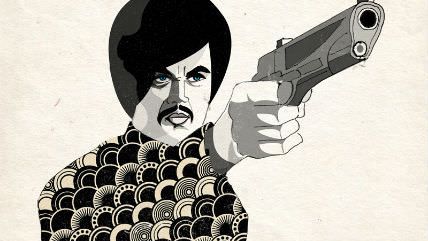Europe's Restrictive Gun Laws Disarm Victims, Not Terrorists
A thriving and unbeatable black market makes weapons available no matter what officials intend.

When wannabe-terrorist Ayoub El Khazzani was wrestled to the floor of a train in France and given a righteous stomping by pissed off and proactive passengers, they relieved him of a small armory. He had been planning to inflict murder and mayhem with an AKM assault rifle, a semiautomatic pistol, a box cutter, and a container of gasoline. Despite themselves being unarmed, three Americans, a French-American, and a Briton jumped Khazzani, beat him with his own rifle, and put an end to his scheme.
But how did the misfired terrorist acquire his intended implements of destruction in supposedly gun-phobic Europe? Could it be that firearms aren't quite so unavailable as right-thinking policy-peddlers assure us on their way to insisting that Americans should be disarmed in (supposed) likewise fashion?
It's a question that was also raised in the wake of the Charlie Hebdo attack by terrorists wielding AK-style rifles, pistols, and submachine guns. Observers were puzzled because France's gun laws are relatively restrictive, and the terrorists clearly hadn't bothered to navigate the byzantine red tape to acquire their weapons. So, where did they come from?
In both cases, the answer is the same. Black markets thrive where legal availability is restricted or forbidden. "The French black market for weapons has been inundated with eastern European war artillery and arms," French police union official Philippe Capon told Bloomberg back in January. "They are everywhere in France."
"According to the French Interior Ministry drug dealers and terrorists have been acquiring these weapon in increasing numbers," The Independent reported after the recent incident.
In fact, off-the-books weapons are so pervasive throughout Western Europe that they render irrelevant the official gun ownership figures relied on by most of the folks tut-tutting over America's crime rate and widespread civilian gun ownership. "The US is an outlier on gun violence because it has way more guns than other developed nations," Vox recently insisted.
Maybe. In reality, "[t]he research community has been unable to reach a consensus as to whether a relationship between guns and crime exist," Xavier University's Matthew Lang, assistant professor of economics, wrote in 2013. Lang also acknowledged that U.S. gun sales have soared since 2007 even as crime has decreased.
And that thriving black market decried by Capon and company make a hash of official numbers. The gap in ownership isn't as wide as the tutters would have it.
"Contrary to the common assumption that Europeans are virtually unarmed, the 15 countries of the European Union have an estimated 84 million firearms. Of that, 67 million (80 per cent) are in civilian hands," noted the Geneva-based Small Arms Survey in 2003.
At that time, the organization reported registered civilian-owned firearms in France as numbering 2.8 million. But unregistered guns owned in defiance of the law were estimated at 15 to 17 million, vastly outnumbering official figures.
Belgium, where the train Khazzani intended to turn into a killing ground originated, had 458,000 registered firearms in 2003. But the unregistered total is again much larger, at an estimated 2 million.
Even in neighboring Germany, stereotyped as a nation of reflexive law-abiders, 7.2 million legal guns are far outnumbered by 17 to 20 million illegal firearms.
Numbers like that outstrip the acquisitive capabilities of even the most active criminal element or terrorist underground. They indicate widespread defiance of gun restrictions by average Europeans, who kept their guns off the books after laws were tightened and topped off their personal collections with weapons smuggled primarily from Eastern Europe—and at surprisingly affordable prices (AK-47s are available in Western Europe for €300 to €700, according to Havocscope, which tracks shadow economic activity).
Actual ownership rates, the Small Arms Survey suggests, reflect the impact of "distinct national cultures…not legal barriers."
Of course, numbers of guns matter less than who has them. Most of the owners of those millions of illegal firearms have no violent intent at all. They simply refuse to comply with the law, perhaps because of the "pervasive culture of non-cooperation with public authorities" that the Survey describes as existing in many nations. That's not a threat to anything more than the job satisfaction of some European bureaucrats. But black markets that inevitably rise up to cater to demand for products that governments want to restrict or ban are also perfectly capable of serving the small numbers of terrorists who want to do enormous harm to the world around them. Officials incapable of disarming the millions of Belgians, French, and Germans who scoff at restrictive gun laws have no hope of denying weapons to a handful of murderous thugs.
The Small Arms Survey emphasized this point long before Charlie Hebdo and the train attack, referring to the "the tiny quantities of small arms required for an organized, long-term terror campaign." For 27 years, the communist November 17 group "based its terror campaign on a handful of guns."
Yes, Europe has, by and large, more restrictive firearms laws than most American states. But those laws haven't had much effect on the actual availability of guns, since they've been met by defiance and helped breed a brisk underground trade. And they're certainly no barrier to small numbers of terrorists who have dedicated themselves to harming others and see the law as no hurdle to achieving that goal.
The main impact then of restrictive gun laws may be to strip law-abiding people of means with which they might defend themselves while leaving criminals and terrorists well-armed. That leaves intended victims in the difficult position of deciding whether to put their heads down and charge a homicidal fanatic holding an assault rifle. When successful, that makes for heroic headlines. But it's a hell of a risky tactic on which to rest your fate.


Show Comments (52)